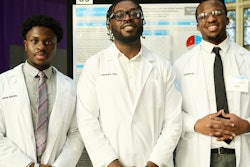COLUMBIA, S.C.
The University of South Carolina will spend nearly $400,000 to fund 18 research projects involving Hurricane Katrina that range from evacuation response among minorities to the storm’s impact on salt marsh estuaries, the school said last week.
The projects — which have a six-month deadline — hope to capture data quickly and provide information that could be used during the next hurricane season and years that follow.
“We didn’t know Hurricane Rita was around the corner,” said Harry Pastides, vice president for research and health sciences. “It’s sad in a way because we truly hoped that the results of the research would be productive and help us to get better prepared the next time around.”
Forty-four proposals with a $25,000 funding limit were submitted earlier this month. Pastides said he was overwhelmed by the faculty’s response, but all the projects couldn’t be funded.
Some of the projects could be used to help South Carolina prepare for hurricanes. Other research could be submitted to federal agencies or published in science and health care journals.
The researchers also are collaborating with universities and colleges in the Gulf Coast area.
Public health professor Keith Elder plans to study disparities in evacuation response including why Blacks in New Orleans didn’t trust the government and public health officials.
“When one group of Americans decides not to listen to government, a huge part of that population could be lost,” he said. “I think this research is pivotal for one reason alone … we really need to understand why African-Americans respond differently.”
Sarah Laditka, an associate professor in the public health school, will be extending a study started earlier this year on how to improve readiness in nursing homes. The owners of a nursing home in Louisiana have been charged in the deaths of 34 patients who were not evacuated before the storm hit.
By gathering information from affected nursing homes and talking to those sheltering displaced Gulf Coast residents, Laditka hopes to train public health students to better manage a vulnerable population during a disaster.
“Given the events of Katrina, this really highlighted an opportunity to enhance the way nursing homes prepare,” she said.
Nursing homes in South Carolina face communication and transportation challenges.
Researchers also are looking into geography and biological issues as well as criminal justice and engineering topics.
“I think what they really wanted to do was prevent this from ever happening again … the impact of the devastation as a result of the response,” Pastides said. “It will not be about finger-pointing.”
— Associated Press
© Copyright 2005 by DiverseEducation.com



















